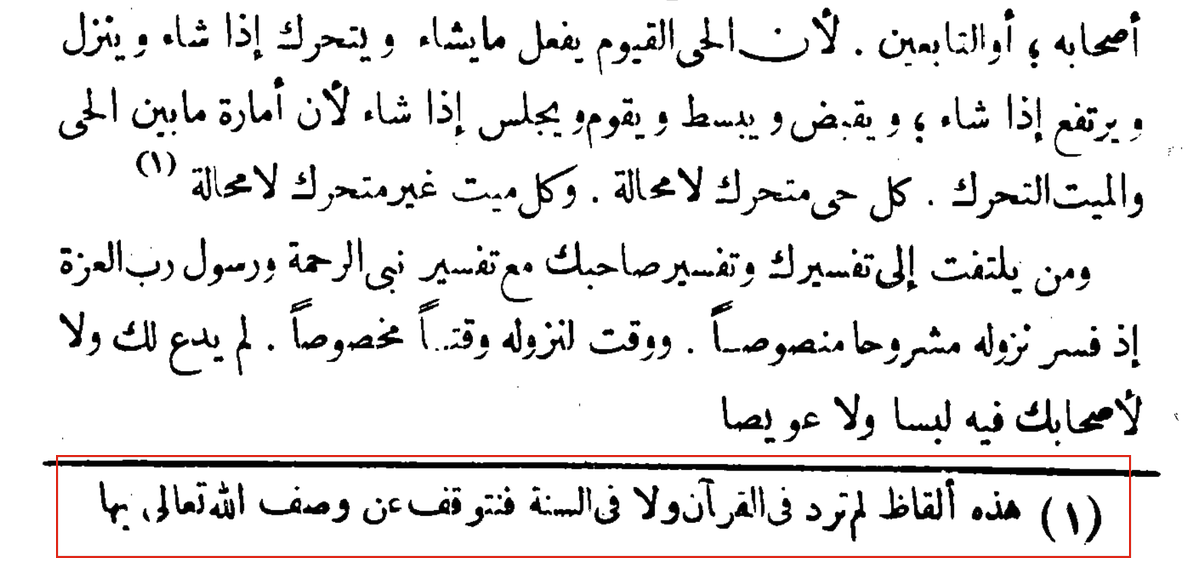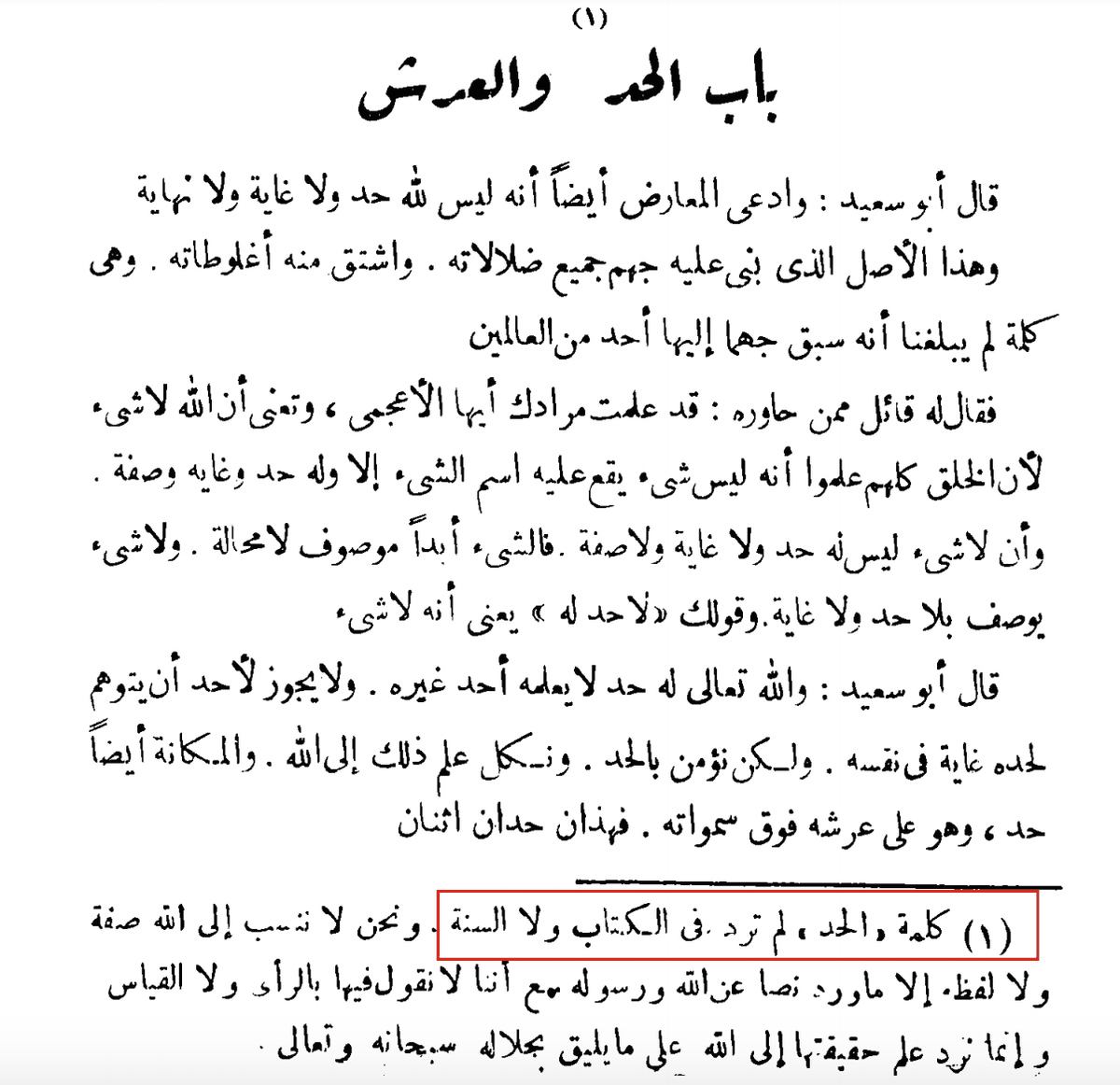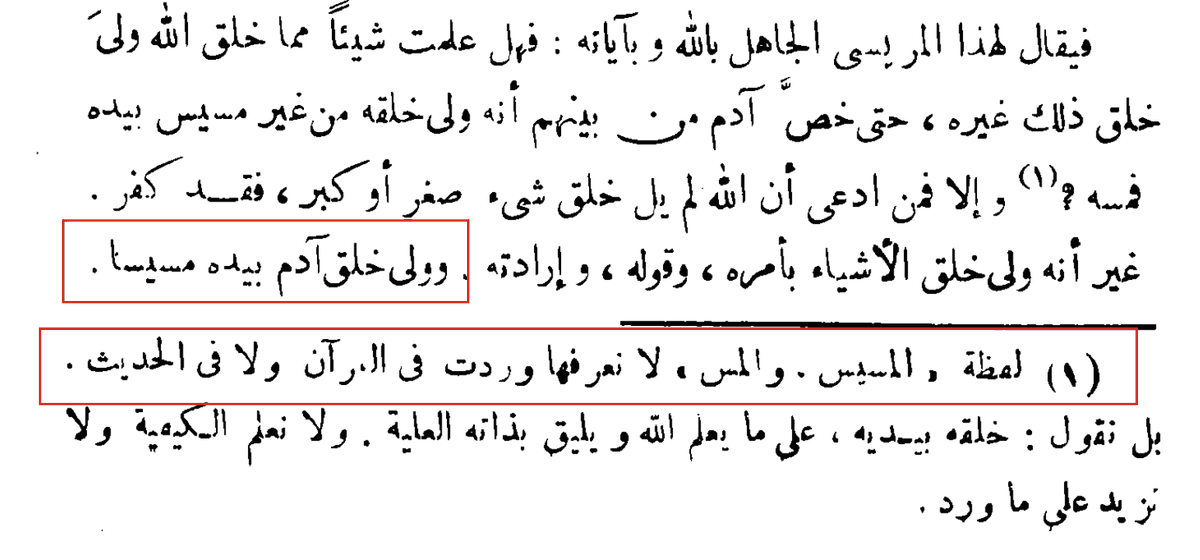From the refutation of Úthmān al-Dārimī of the Mútazilī Bishr al-Marīsī:
He [Bishr] said: “Don’t you see that you cannot say of one who ascended a mountain, ‘He is closer to Allāh.’”
It should be said to this objector who claims about that which he has no knowledge: https://twitter.com/IbneKhan01/status/1374022555057676295">https://twitter.com/IbneKhan0...
He [Bishr] said: “Don’t you see that you cannot say of one who ascended a mountain, ‘He is closer to Allāh.’”
It should be said to this objector who claims about that which he has no knowledge: https://twitter.com/IbneKhan01/status/1374022555057676295">https://twitter.com/IbneKhan0...
Who told you that the peak of the mountain is not closer to Allāh than the bottom of it? As the one who believes that Allāh is [physically] above His Throne and above His heavens knows for certain that the peak of the mountain is closer to the sky than the bottom of it,
and that the seventh heaven is closer to the Throne of Allāh than the sixth, and that the sixth is closer to it than the fifth and so on down to the earth. Similarly, Is’ĥāq ibn Ibrāhīm al-Ĥanżalī [ibn Rāhawayh] reported that Ibn al-Mubārak said: “The top of the minaret is closer
to Allāh than the bottom of it.” Ibn al-Mubārak spoke the truth, for whatever is closer to the sky is closer to Allāh.
— Radd al-Dārimī álā Bishr al-Marīsī, page 100.
— Radd al-Dārimī álā Bishr al-Marīsī, page 100.
This report is not reliable, as it is recorded that Is’ĥāq ibn Rāhawayh abandoned narrating from Ábdullāh ibn al-Mubārak as he was not proficient in taking from him, as is necessary.
Let us look at some more of the writings of Úthmān al-Dārimī which display his tajsīm, on page 20 of the same book:
“The Living, the Self-Subsistent, does what He Wills, moves when He Wills, descends and ascends when He Wills, takes hold and spreads,
“The Living, the Self-Subsistent, does what He Wills, moves when He Wills, descends and ascends when He Wills, takes hold and spreads,
stands and sits when He Wills, for the differentiating factor between the living and the dead is movement; every living thing moves without fail, and every dead thing is immobile without fail.”
Where is this from the Qur& #39;ān and Sunnah?
Where is this from the Qur& #39;ān and Sunnah?
On page 23:
“The opponent also claimed that Allāh does not possess a limit [hadd], restriction [ghāyah], or extremity [nihāyah], and this is the basis upon which Jahm [ibn Safwān] built his misguidance and derived all of his errors.
“The opponent also claimed that Allāh does not possess a limit [hadd], restriction [ghāyah], or extremity [nihāyah], and this is the basis upon which Jahm [ibn Safwān] built his misguidance and derived all of his errors.
It has not reached us that anyone in the world preceded Jahm with it.
One who was discussing this with him said to him: I have come to know your intent oh non-Arab; you intend that Allāh is nothing, because all of the creation have known that there is nothing that is called a
One who was discussing this with him said to him: I have come to know your intent oh non-Arab; you intend that Allāh is nothing, because all of the creation have known that there is nothing that is called a
“thing” except that it has a limit [hadd], restriction [ghāyah], and an attribute. There is no “thing” except that it has a limit [hadd], restriction [ghāyah], and an attribute.
So that which is a “thing” is always described as such.
So that which is a “thing” is always described as such.
Nothing is described without a limit or restriction. Your statement, ‘He has no limit’, means that He is nothing.”
Is this not using reasoning in matters of creed? Where is the evidence for this in the Qur& #39;ān and Sunnah? Moreover, this is clear-cut tajsīm.
Is this not using reasoning in matters of creed? Where is the evidence for this in the Qur& #39;ān and Sunnah? Moreover, this is clear-cut tajsīm.
Even the editor mentions in the footnotes that such things are not found in the Qur& #39;ān and Sunnah, and should not be mentioned.
Why is it they accuse Ashárīs and Māturīdīs of this, but their own books are full of tajsīm not found in the Book and the Sunnah?
Why is it they accuse Ashárīs and Māturīdīs of this, but their own books are full of tajsīm not found in the Book and the Sunnah?
He further says on the same page:
“Allāh táālā has a limit [hadd] that none knows other than He, and it is not permissible for anyone to imagine in himself a restriction [ghāyah] to His limit, however we believe in the limit, and we leave the knowledge of it to Allāh.
“Allāh táālā has a limit [hadd] that none knows other than He, and it is not permissible for anyone to imagine in himself a restriction [ghāyah] to His limit, however we believe in the limit, and we leave the knowledge of it to Allāh.
Being in a place [makānah] is also a limit, and He is [physically] above His Throne, above His Heavens; so these are two limits.”
So extreme is their affirmation, that if one rejects this, then they say he has committed kufr.
On page 24, after quoting verses which he thinks support him, he says:
“The one who does not acknowledge it [i.e. the limit], then indeed he has disbelieved in the revelation of
On page 24, after quoting verses which he thinks support him, he says:
“The one who does not acknowledge it [i.e. the limit], then indeed he has disbelieved in the revelation of
Allāh, and denied the verses of Allāh.”
He writes on page 25:
“He created Ādam with His Hand, touching him.”
Again, the editor writes in the footnote that this is not known from the Qur& #39;ān or hadīth.
“He created Ādam with His Hand, touching him.”
Again, the editor writes in the footnote that this is not known from the Qur& #39;ān or hadīth.
On page 85:
“Verily, Allāh is greater than all things and greater than all creation, and the Throne is not carrying Him by [its] glory and strength, nor are the carriers of the Throne carrying it by their strength; but they carried it by His Power, His Will and His Support,
“Verily, Allāh is greater than all things and greater than all creation, and the Throne is not carrying Him by [its] glory and strength, nor are the carriers of the Throne carrying it by their strength; but they carried it by His Power, His Will and His Support,
if that were not so, they would not be able to bear it.
It has reached us that when they carried the Throne, and [physically] above it was the Almighty, in His Glory and His Splendour, they became weak from carrying it, and they became lowly, and knelt down on their knees,
It has reached us that when they carried the Throne, and [physically] above it was the Almighty, in His Glory and His Splendour, they became weak from carrying it, and they became lowly, and knelt down on their knees,
until they were taught to read: ‘There is no power nor might, except with Allāh.’ Then, they bore it by the power of Allāh and His Will.
And if it were not for that, the Throne would not be able to bear Him, nor the carriers, nor the heavens, nor the earth, nor those in them.
And if it were not for that, the Throne would not be able to bear Him, nor the carriers, nor the heavens, nor the earth, nor those in them.
Had He willed, He could have settled on the back of a mosquito, and so it would bear Him, by His power and the subtlety of His Lordship. Thus, what of the Great Throne, that is greater than the seven heavens and the seven earths?
And how do you deny, O arrogant one, that His Throne bears Him, when the Throne is greater than the seven heavens and the seven earths? And had the Throne been in the heavens and the earth, they would not have contained it, but it is above the seventh heaven.”
From this we learn, according to the author:
1. The Throne carries Allāh táālā
2. The Angels could not initially carry the Throne because Allāh was above it
3. If Allāh willed He could have settled on the back of a mosquito and it would bear Him
1. The Throne carries Allāh táālā
2. The Angels could not initially carry the Throne because Allāh was above it
3. If Allāh willed He could have settled on the back of a mosquito and it would bear Him
This is nothing other than affirming a body for Allāh and that Allāh is a physical being, physically above the Throne. It is explicit anthropomorphism, and there are many more examples in this very book and others which Wahābīs take from as their sources.

 Read on Twitter
Read on Twitter![From the refutation of Úthmān al-Dārimī of the Mútazilī Bishr al-Marīsī:He [Bishr] said: “Don’t you see that you cannot say of one who ascended a mountain, ‘He is closer to Allāh.’” It should be said to this objector who claims about that which he has no knowledge: https://twitter.com/IbneKhan0... From the refutation of Úthmān al-Dārimī of the Mútazilī Bishr al-Marīsī:He [Bishr] said: “Don’t you see that you cannot say of one who ascended a mountain, ‘He is closer to Allāh.’” It should be said to this objector who claims about that which he has no knowledge: https://twitter.com/IbneKhan0...](https://pbs.twimg.com/media/ExJPCVpWYAUy8Dz.png)

![On page 23:“The opponent also claimed that Allāh does not possess a limit [hadd], restriction [ghāyah], or extremity [nihāyah], and this is the basis upon which Jahm [ibn Safwān] built his misguidance and derived all of his errors. On page 23:“The opponent also claimed that Allāh does not possess a limit [hadd], restriction [ghāyah], or extremity [nihāyah], and this is the basis upon which Jahm [ibn Safwān] built his misguidance and derived all of his errors.](https://pbs.twimg.com/media/ExJc7OwWYAUXI18.png)


![He further says on the same page:“Allāh táālā has a limit [hadd] that none knows other than He, and it is not permissible for anyone to imagine in himself a restriction [ghāyah] to His limit, however we believe in the limit, and we leave the knowledge of it to Allāh. He further says on the same page:“Allāh táālā has a limit [hadd] that none knows other than He, and it is not permissible for anyone to imagine in himself a restriction [ghāyah] to His limit, however we believe in the limit, and we leave the knowledge of it to Allāh.](https://pbs.twimg.com/media/ExJgKwYW8AMq-RM.png)
![So extreme is their affirmation, that if one rejects this, then they say he has committed kufr. On page 24, after quoting verses which he thinks support him, he says:“The one who does not acknowledge it [i.e. the limit], then indeed he has disbelieved in the revelation of So extreme is their affirmation, that if one rejects this, then they say he has committed kufr. On page 24, after quoting verses which he thinks support him, he says:“The one who does not acknowledge it [i.e. the limit], then indeed he has disbelieved in the revelation of](https://pbs.twimg.com/media/ExJk109W8AApiP8.png)

![On page 85:“Verily, Allāh is greater than all things and greater than all creation, and the Throne is not carrying Him by [its] glory and strength, nor are the carriers of the Throne carrying it by their strength; but they carried it by His Power, His Will and His Support, On page 85:“Verily, Allāh is greater than all things and greater than all creation, and the Throne is not carrying Him by [its] glory and strength, nor are the carriers of the Throne carrying it by their strength; but they carried it by His Power, His Will and His Support,](https://pbs.twimg.com/media/ExLqrPaUcAI4IUc.png)


